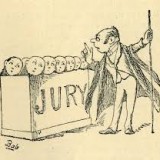Jury can know about all defence medical examinations.
On November 27, 2015, the BC Supreme Court confirmed that it is fair game for plaintiffs to testify that they attended a defence medical exam where no report was produced and the defence is not relying on opinion evidence from their expert.
In Norris v. Burgess the plaintiff alleged injury as a result of two collisions. The defendants denied any injury occurred. In the course of the lawsuit the plaintiff attended a defence medical appointment with a psychiatrist. The defendants “chose not to obtain a medical opinion from the psychiatrist” and did not call him as a witness. In the course of trial the defendants objected to the plaintiff testifying “as to her attendance and surrounding circumstances of the independent medical examination“.
In ruling that such testimony is fair game Mr. Justice Funt provided the following reasons:
[12] The Court will rule in the plaintiff’s favour.
[13] As Rule 7-6 of the Supreme Court Civil Rules contemplates, an individual medical examination may be ordered where the “physical or mental condition of a person is in issue”. In this case, the independent medical examination was not pursuant to a court order. The Rule, however, illustrates that an independent medical examination will usually occur only where there is a physical or mental condition in issue.
[14] The plaintiff’s medical condition is clearly in issue. Where the defence asserts that the plaintiff may have exaggerated her injuries, steps taken by the plaintiff at the request of the defence may be relevant.
[15] Even if there were for closing argument an agreed stipulation of the plaintiff’s attendance at the independent medical examination, I would prefer that the evidence be led as part of the plaintiff’s case. I would be concerned that the jury could be confused. Evidence and argument should be kept separate.
[16] Civil litigation is adversarial and litigant-driven. Where one party asks that the other party attend an interview or examination with a third person (whether or not that person is an expert) and the other party so attends, the requesting party should not be surprised that the interview or examination may be relevant with evidentiary consequences, including the possibility of an adverse inference. An unwanted but foreseeable consequence does not give rise to unfair prejudice.
[17] In short, plaintiff’s counsel may lead evidence as to the plaintiff’s attendance, and surrounding circumstances, regarding the independent medical examination requested by the defendants.





